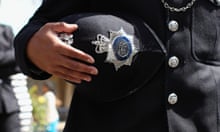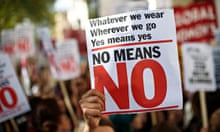Three years ago, few people outside the world of professional football had heard of Ched Evans. When the Sheffield United player was convicted of rape, in April 2012, the identity of his victim should have remained a secret, protected by a law that gives lifelong anonymity to complainants. Instead, she has repeatedly been named on the internet and forced to move home five times. It is one of the worst instances of victim-blaming ever seen in this country.
The attacks on the character of this young woman, who was only 19 when Evans raped her, have been cruel and shameful. Ten people, including Evans’s cousin, have been charged and convicted of naming her on social media.
Neither those cases, nor a decision by the court of appeal to turn down Evans’s attempt to challenge his conviction and sentence, have prevented further slurs. On the contrary, a man whose name now appears on the sex offenders’ register is being presented by his supporters as the victim in the case.
A website set up by Evans’s family and friends is currently under investigation by the attorney general and the Crown Prosecution Service for posting CCTV footage of the victim entering the hotel where the rape took place. Even though her features are blurred, the risk of further identification is obvious and an offence may have been committed.
In the latest twist, a man described on the site as a “true friend and supporter” of Evans turns out to have made abusive comments about the victim and posted a link to a separate site that names her. Until last week the Evans family site displayed a photograph of the man, Ciaran Goggins, wearing a “Ched Evans is innocent” T-shirt at an Amnesty International event in Ireland.
It is hard to think of another case in which the reaction of the convicted man’s friends has been so vindictive and hysterical. There is a reason for this: although it is the last thing any woman would choose, the victim in this case has become the symbol of a successful fightback against rape culture.
Evans’s conviction is a sign of changing attitudes in the criminal justice system, which is now prepared to prosecute ‘difficult’ and historic cases that would not have got to court in the past.
It also demonstrates that some, though by no means all, jurors are willing to put aside rape myths about how victims should behave. The impact on defendants who have in the past relied on those myths to escape conviction cannot be overstated.
Evans’s victim was drunk. When he went to the hotel in Rhyl where one of his friends had taken her, she was in no state to consent to have sex with a total stranger who had just walked into the room. The judge at Evans’s trial, Merfyn Hughes QC, was clear on this point: ‘The complainant was extremely intoxicated … She was in no condition to have sexual intercourse.”
In the harsh lexicon of victim-blaming, having sex with a drunk woman could not possibly be rape. It is up there in the top five excuses used by rape apologists, along with the idea that women “invite” attacks through their choice of clothes or behaviour. The whole point of victim-blaming is to draw attention away from perpetrators, whose behaviour has only very recently begun to be scrutinised as closely as it deserves.
Why would a man like Evans, with a promising career to lose, risk having sex with a woman who is too inebriated to give consent? The probable answer is, because so many men have done so in the past, laughing with their mates over what is actually a criminal assault.
Two developments – this case and the convictions of a series of well-known men accused of historic sex abuse – provide dramatic evidence that attitudes are changing. Rolf Harris, Max Clifford and Stuart Hall didn’t think anyone would believe their victims, some of whom were under the age of consent. It turns out they were wrong. And while there are still too few rape convictions in this country, the old excuses are being chipped away.
The consequences for men who refuse to modify their behaviour are terrifying. That is why they and their supporters are so angry: if this vile spasm of victim-blaming proves one thing, it is that they are finally losing the argument.





